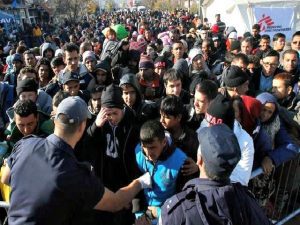 In flurry of activity, President Trump issued an executive order entitled “Protecting the Nation From Foreign Terrorist Entry Into the United States” (you can read the full text here). The key points of the Executive Order are:
In flurry of activity, President Trump issued an executive order entitled “Protecting the Nation From Foreign Terrorist Entry Into the United States” (you can read the full text here). The key points of the Executive Order are:
- 90-day ban on entry into the US from Iraq, Iran, Syria, Libya, Yemen, Somalia and Sudan
- 120-day suspension of the refugee resettlement program
- Indefinite suspension of the arrival of Syrian refugees
- 64% decrease for refugees admitted into the US in 2017
- Prioritization of refugees who are religious minorities suffering religious persecution
- Mandated review of stricter vetting procedures for refugees and immigrants.
The Franciscan OFM friars of the United States have issued a joint Franciscan Statement on the Immigration Ban:
“I was a stranger and you welcomed me” (Matthew 25.35).
The recent actions of President Donald J. Trump regarding the treatment of immigrants and refugees entering our country have been troubling to a wide-ranging group of citizens across the United States. As Franciscans, we are morally outraged by and resolutely denounce the January 27, 2017 Executive Order addressing the US immigrant and refugee admission program.
While the action’s stated intention is to protect the U.S. from terrorism, it is ill conceived and counter to our country’s founding principles. Furthermore, whether intended or not, it is perceived as targeting Muslims and as suggesting that all Islamic immigrants and refugees are suspect. This is an affront to the human dignity of our refugee sisters and brothers fleeing persecution and war, and the many immigrants who hope for a better life on our shores. We believe that the order as written and implemented sows division and animosity, making the solidarity that leads to security less possible.
We feel compelled to add our support to the many voices from various sectors of our society who also have denounced this Executive Order: refugees and migrants themselves, business leaders, civic and political leaders, public personalities, and religious leaders including many US Catholic Bishops.
Some of our ministries have been fortunate to welcome refugees into their communities, working with Church organizations contracted by the US government after the lengthy (usually two to four years) vetting process already in place. Still other ministries have been places of welcome for immigrants, carrying out the Biblical mandate to “welcome the stranger.”
Pope Francis, during his 2015 visit to the U.S., reminded Americans of the importance of our own identity as immigrants. He said, “As the son of an immigrant family, I am happy to be a guest in this country, which was largely built by such families.” Our country, at its best, has cherished and embodied this decree to “welcome the stranger” by proudly embracing its identity as a nation of immigrants.
Considering this heritage and in solidarity with our immigrant and refugee brothers and sisters, we Franciscans commit ourselves to:
- Advocate for the withdrawal of the January 27 Executive Order;
- Prepare to be communities that offer hospitality to our refugee brothers and sisters; and
- Continue to reach out to and deepen our commitment to solidarity with our Muslim brothers and sisters.
We pray that God’s wisdom will prevail and will lead all of us to seek the Common Good.
Franciscan Friars (OFM) of the United States of America
Very Rev. James Gannon, OFM
Assumption BVM Province
Franklin, WI
Very Rev. Kevin Mullen, OFM
Holy Name Province
New York, NY
Very Rev. Robert Campagna, OFM
Immaculate Conception Province
New York, NY
Very Rev. Jack Clark Robinson, OFM
Our Lady of Guadalupe Province
Albuquerque, NM
Very Rev. William Spencer, OFM
Sacred Heart Province
St. Louis, MO
Very Rev. David Gaa, OFM
Saint Barbara Province
Oakland, CA
Very Rev. Jeffrey Scheeler, OFM
Saint John the Baptist Province
Cincinnati, OH
In addition, President Trump issued two multi-pronged orders on border security and immigration enforcement including: the authorization of a U.S.-Mexico border wall; the stripping of federal grant money to sanctuary cities; hiring 5,000 more Border Patrol agents; ending “catch-and-release” policies for illegal immigrants; and reinstating local and state immigration enforcement partnerships. The Executive Orders include:
- Border Security
- Interior Enforcement
- Refugee Resettlement (above)
A summary of the Executive Orders
Border Enforcement EO “Border Security and Immigration Enforcement Improvements”
- Moves forward with construction of a wall at the Mexico-US border
- Increases the number of Border Patrol Officers
- Increases detention facilities and detention itself
- Limits and narrows protections for asylum seekers
- Fast-tracks deportations
Interior Enforcement EO “Enhancing Public Safety in the Interior of the United States”
- Expands the priorities DHS will use for who to apprehend and deport; now includes any criminal offense (e.g. driving with a suspended license) or a person deemed a “safety risk” by an immigration officer
- Attempts to defund “sanctuary cities” from federal funding if the city is not in full compliance with 8 U.S. Code 1373 (sharing of information regarding immigration status, lawful or unlawful, of people)
- Deputizes local law enforcement to enforce immigration law
- Reinstates “Secure Communities” which allows racial profiling
- Begins process to impose civil fines and penalties on those facilitating undocumented presence in the US




